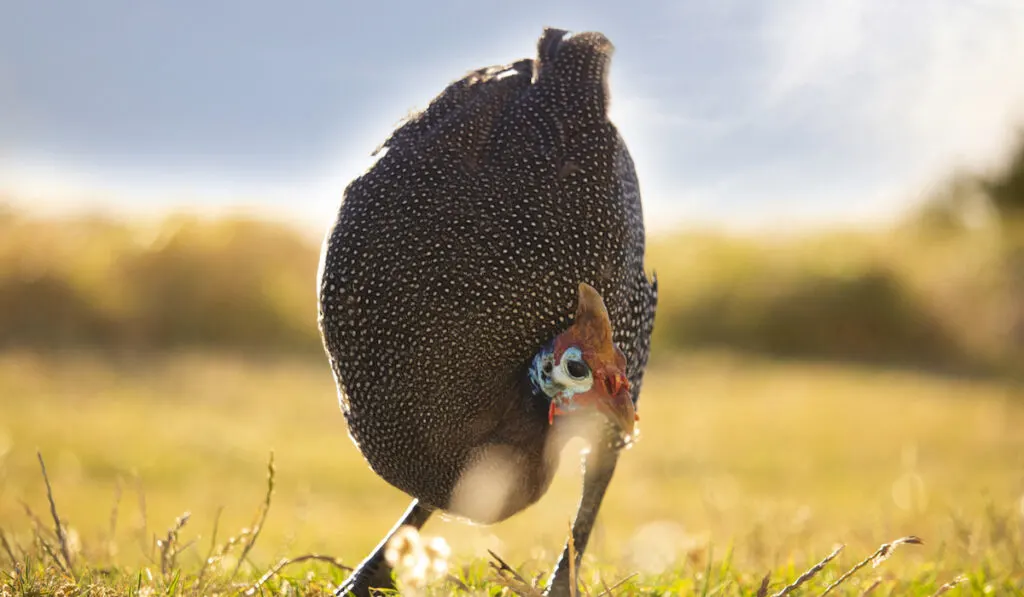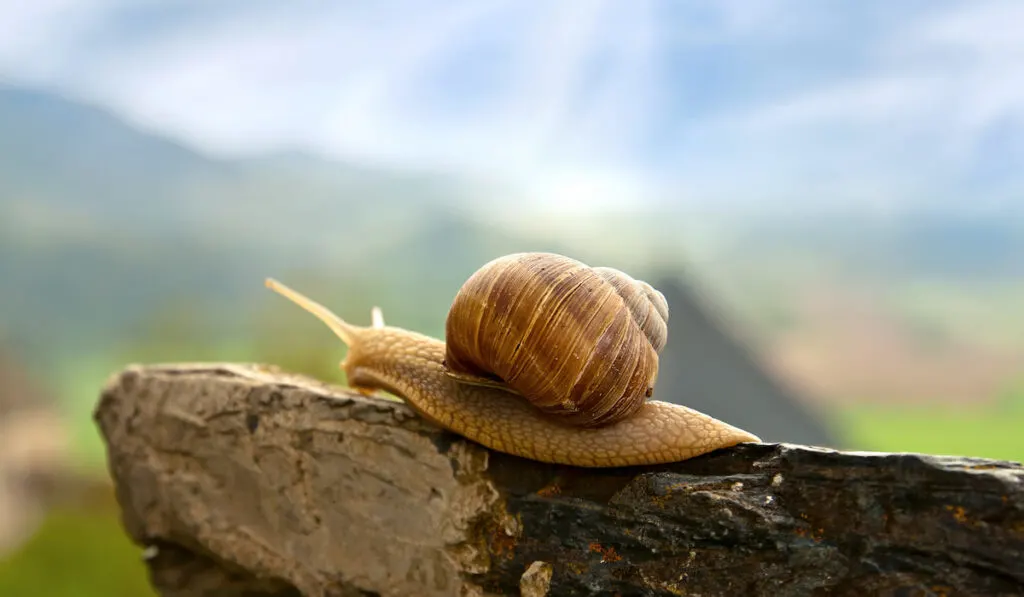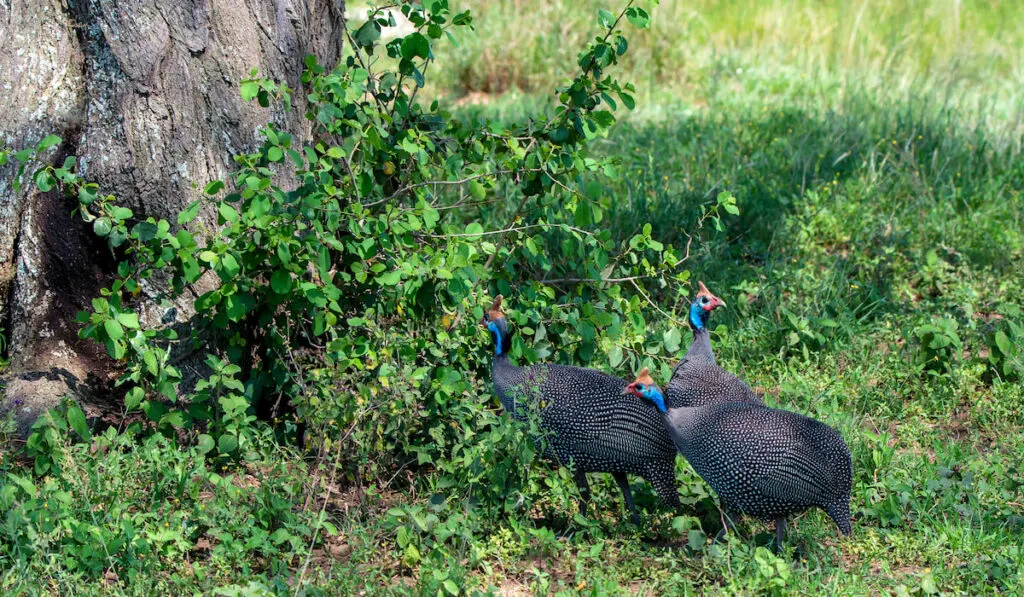Guinea hens will eat slugs and snails very happily. They are constantly feeding and they will devour any small insect or mollusk that crosses paths with them. They will strip snails out of their shells and free a garden from slugs in very little time, especially if you have several guinea hens.
Keeping down pest species like slugs and snails can be a real challenge, because not many creatures eat these slimy pests. If you have a flock of guinea hens, however, you will soon find that your slug problems are solved and your plants are safe.
Table of Contents
Can Guinea Hens Eat Slugs and Snails?
Yes, guinea hens will happily eat both slugs and snails. They are not deterred by the slimy texture and seem to have no problem tackling even large slugs and snails. They are also unbothered by the challenge of getting snails out of their shells.
If you have guinea hens, you will find that they quickly start to reduce a population of snails. Empty shells will begin to litter your garden as they pluck out the squishy inhabitants and devour them.
They are generally considered a very efficient form of pest control, and they will take out both slugs and snails far more effectively than many of the common remedies like salt, beer traps, copper strips, etc.
If you have a small farm and you want to move away from pesticides and chemical treatments, consider getting a flock of guinea hens and letting them roam among your crops. They will make quick work of the invaders stripping your plants of their leaves.
Will Guinea Hens Damage Plants?
Of course, the other important question is whether they will do more damage to your crops than they are preventing. If guinea hens wreck plants even more than the slugs or snails, they aren’t a great option for pest control.
In general, however, guinea hens do not bother plants at all. They are far less destructive than chickens, which may peck and scratch at vegetables, and often reject slugs and snails in favor of other invertebrates.
It is usually safe to let guinea hens roam around a vegetable patch and forage. The only danger is that they may scratch up the earth in an effort to get at a tasty morsel they have detected, and this could damage the plants, especially if they get enthusiastic.
Guinea hens are fairly large birds, and they can damage crops in some cases, but this is pretty rare. Many farmers allow their flock to forage in among any plants that they choose, and the only result is pest-free crops.
They are also safe around flowers, so if you are trying to enjoy some ornamental plants and they are being decimated by slugs and snails, a few guinea hens can be a great way to resolve the problem.
Guinea hens do not eat plants, and therefore they are unlikely to do any significant damage to them.
There may be an occasional accidental plant casualty, but on the whole, they are very safe to allow among your plants.
This is fortunate, because guinea hens are strong fliers from a young age, and it can be hard to keep them out of an area unless you keep them penned.

If you have a farm and free-range guinea hens, it’s best to just let them roam as they choose to. They will not do much damage.
Should I Feed Slugs to My Guinea Hens?
It is perfectly safe to feed slugs to your guinea hens, yes. Some people like to go out with a flashlight and collect up slugs after dark, which is when the slugs tend to come out to feed. Of course, they are safe from your guinea hens at this time because the birds will be roosting and asleep.
Slugs and snails often use this opportunity, when most of their predators are not around, to feast on plants, and they can do amazing amounts of damage in a single night.
You can solve this problem by manually collecting lots of slugs and transferring them to a bucket. Feed this to your guinea hens when they get up the following morning, and you’ll have fewer pests on your plants!
This is hard work, but on the whole, guinea hens will keep on top of a slug population once they are established in an area, and this is just a measure to quickly cut down the numbers.
Do Guinea Hens Like Slugs and Snails?

Surprisingly, birds can have quite varied preferences between individuals. One guinea hen might eat slugs and snails over worms, while another might make the opposite choice. It seems their tastes vary just like the tastes of people do.
However, guinea hens are all known for being keen slug and snail predators. They will strip them from the undersides of leaves and hunt them on plant stems and in the undergrowth. Although slugs spend large parts of the day hiding from predators and the hot sun, guinea hens will still find them.
And so it seems reasonable to think that guinea hens do like snails and slugs.
Are Slugs Healthy for Guinea Hens?
Yes, slugs and snails are perfectly good food for a guinea hen, and part of a balanced diet. Guinea hens need to forage for many other kinds of food as well as slugs, but they are healthy.
Do not try to feed guinea hens on a diet of exclusively slugs and snails, however. If your guinea hens are not allowed to roam, you should be giving them a commercial feed so that they have a balanced diet.
If they are free-roaming, they will balance their diet and moderate what they eat by themselves. Don’t worry about them eating too many slugs and snails while roaming.

Conclusion
So, guinea hens do eat slugs and snails. If you’re having issues with slugs and snails attacking your plants, guinea hens are a wonderful solution.
They will efficiently strip these pests off the leaves, out of their hiding holes, and away from your crops. Guinea hens love them and will eat as many as you have!
Resources
- http://www.guineafowlsource.com/the-pros-and-cons-of-guinea-fowl/
- https://www.backyardchickens.com/threads/do-guineas-eat-slugs-as-well-as-bugs-please-advise-me-before-buying.66869/
- https://gracelikestogarden.com/fowl/guinea-fowl/
- https://poultry.extension.org/articles/poultry-management/raising-guinea-fowl-in-small-and-backyard-flocks/
